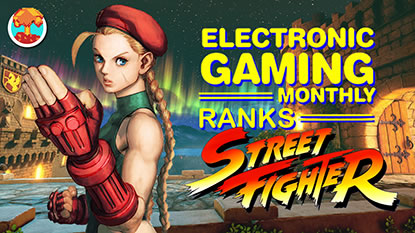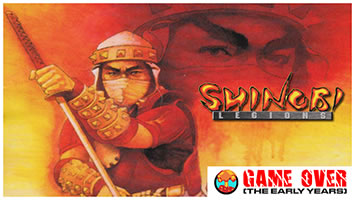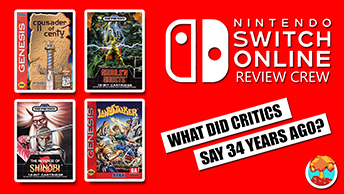- CLASSIC MAGAZINES
- REVIEW CREW
A show recapping what critics thought back
when classic games first came out! - NEXT GENERATION'S BEST & WORST
From the worst 1-star reviews to the best
5-stars can offer, this is Next Generation! - NINTENDO POWER (ARCHIVE)
Experience a variety of shows looking at the
often baffling history of Nintendo Power! - MAGAZINE RETROSPECTIVE
We're looking at the absolutely true history of
some of the most iconic game magazines ever! - SUPER PLAY'S TOP 600
The longest and most ambitious Super NES
countdown on the internet! - THEY SAID WHAT?
Debunking predictions and gossip found
in classic video game magazines! - NEXT GENERATION UNCOVERED
Cyril is back in this spin-off series, featuring the
cover critic review the art of Next Generation! - HARDCORE GAMER MAGAZING (PDF ISSUES)
Download all 36 issues of Hardcore Gamer
Magazine and relive the fun in PDF form!
- REVIEW CREW
- ELECTRONIC GAMING MONTHLY
- ELECTRONIC GAMING MONTHLY RANKS
From Mario to Sonic to Street Fighter, EGM
ranks classic game franchises and consoles! - ELECTRONIC GAMING MONTHLY BEST & WORST
Counting down EGM’s best and worst reviews
going year by year, from 1989 – 2009! - ELECTRONIC GAMING BEST & WORST AWARDS
11-part video series chronicling the ups and
downs of EGM’s Best & Worst Awards!
- ELECTRONIC GAMING MONTHLY RANKS
- GAME HISTORY
- GAME OVER: STORY BREAKDOWNS
Long-running series breaking down game
stories and analyzing their endings! - A BRIEF HISTORY OF GAMING w/ [NAME HERE]
Real history presented in a fun and pithy
format from a variety of game historians! - THE BLACK SHEEP
A series looking back at the black sheep
entries in popular game franchises! - INSTANT EXPERT
Everything you could possibly want to know
about a wide variety of gaming topics! - FREEZE FRAME
When something familiar happens in the games
industry, we're there to take a picture! - I'VE GOT YOUR NUMBER
Learn real video game history through a series
of number-themed episodes, starting at zero! - GREAT MOMENTS IN BAD ACTING
A joyous celebration of some of gaming's
absolute worst voice acting!
- GAME OVER: STORY BREAKDOWNS
- POPULAR SHOWS
- DG NEWS w/ LORNE RISELEY
Newsman Lorne Riseley hosts a regular
series looking at the hottest gaming news! - REVIEW REWIND
Cyril replays a game he reviewed 10+ years
ago to see if he got it right or wrong! - ON-RUNNING FEUDS
Defunct Games' longest-running show, with
editorials, observations and other fun oddities! - DEFUNCT GAMES QUIZ (ARCHIVE)
From online quizzes to game shows, we're
putting your video game knowledge to the test!- QUIZ: ONLINE PASS
Take a weekly quiz to see how well you know
the news and current gaming events! - QUIZ: KNOW THE GAME
One-on-one quiz show where contestants
find out if they actually know classic games! - QUIZ: THE LEADERBOARD
Can you guess the game based on the classic
review? Find out with The Leaderboard!
- QUIZ: ONLINE PASS
- DEFUNCT GAMES VS.
Cyril and the Defunct Games staff isn't afraid
to choose their favorite games and more! - CYRIL READS WORLDS OF POWER
Defunct Games recreates classic game
novelizations through the audio book format!
- DG NEWS w/ LORNE RISELEY
- COMEDY
- GAME EXPECTANCY
How long will your favorite hero live? We crunch
the numbers in this series about dying! - VIDEO GAME ADVICE
Famous game characters answer real personal
advice questions with a humorous slant! - FAKE GAMES: GUERILLA SCRAPBOOK
A long-running series about fake games and
the people who love them (covers included)! - WORST GAME EVER
A contest that attempts to create the worst
video game ever made, complete with covers! - LEVEL 1 STORIES
Literature based on the first stages of some
of your favorite classic video games! - THE COVER CRITIC
One of Defunct Games' earliest shows, Cover
Critic digs up some of the worst box art ever! - COMMERCIAL BREAK
Take a trip through some of the best and
worst video game advertisements of all time! - COMIC BOOK MODS
You've never seen comics like this before.
A curious mix of rewritten video game comics!
- GAME EXPECTANCY
- SERIES ARCHIVE
- NINTENDO SWITCH ONLINE ARCHIVE
A regularly-updated list of every Nintendo
Switch Online release, plus links to review! - PLAYSTATION PLUS CLASSIC ARCHIVE
A comprehensive list of every PlayStation
Plus classic release, including links! - RETRO-BIT PUBLISHING ARCHIVE
A regularly-updated list of every Retro-Bit
game released! - REVIEW MARATHONS w/ ADAM WALLACE
Join critic Adam Wallace as he takes us on a
classic review marathon with different themes!- DEFUNCT GAMES GOLF CLUB
Adam Wallace takes to the links to slice his way
through 72 classic golf game reviews! - 007 IN PIXELS
Adam Wallace takes on the world's greatest spy
as he reviews 15 weeks of James Bond games! - A SALUTE TO VAMPIRES
Adam Wallace is sinking his teeth into a series
covering Castlevania, BloodRayne and more! - CAPCOM'S CURSE
Adam Wallace is celebrating 13 days of Halloween
with a line-up of Capcom's scariest games! - THE FALL OF SUPERMAN
Adam Wallace is a man of steel for playing
some of the absolute worst Superman games! - THE 31 GAMES OF HALLOWEEN
Adam Wallace spends every day of October afraid
as he reviews some of the scariest games ever! - 12 WEEKS OF STAR TREK
Adam Wallace boldly goes where no critic has
gone before in this Star Trek marathon!
- DEFUNCT GAMES GOLF CLUB
- DAYS OF CHRISTMAS (ARCHIVE)
Annual holiday series with themed-episodes
that date all the way back to 2001!- 2015: 30 Ridiculous Retro Rumors
- 2014: 29 Magazines of Christmas
- 2013: 29 Questionable Power-Ups of Christmas
- 2012: 34 Theme Songs of Christmas
- 2011: 32 Game Endings of Christmas
- 2010: 31 Bonus Levels of Christmas
- 2009: 30 Genres of Christmas
- 2008: 29 Controls of Christmas
- 2007: 34 Cliches of Christmas
- 2006: 33 Consoles of Christmas
- 2005: 32 Articles of Christmas
- 2004: 31 Websites of Christmas
- 2003: 29 Issues of Christmas
- 2002: 28 Years of Christmas
- 2001: 33 Days of Christmas
- NINTENDO SWITCH ONLINE ARCHIVE
- REVIEW ARCHIVE
- FULL ARCHIVE
Mitch Gitelman Goes Down!

After this article I have a hunch we can scratch off our interview with Mitch at this year's E3!
There are a few things to keep in mind while reading Mitch's quotes (and my rebuttals). First and foremost, many game critics have complained that Shadowrun is a full price game ($60) that does not feature a single-player campaign. They also point out that there are only nine maps and two different game modes. As of press time Shadowrun is averaging a score of 70%, which most sites consider to be in the "good" range. These twelve quotes come from two different podcasts, one from Major Nelson and the other from OXM's podcast. Where possible we tried to retain the quotes context, however, in the case that some of the quotes are pulled out without a set up we have done our best to represent his statement in an honest way. Furthermore, if you would like to actually hear Mitch say the words we have written down then I suggest you click the media player above all of the quotes and read along. After you read this three page article I think you will agree that Mitch Gitelman has completely lost his mind!
Quote 1: Game Critic or Consumer Advocate?
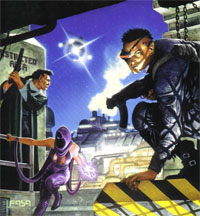
Despite what it sounds like, Shadowrun is a fun game that suffers from a few flaws. That shouldn't keep you from checking it out, just don't expect it to feel fleshed out enough to warrant the full $60 asking price!
"Average review rating: 70% out of 100. Alright, well first of all that pisses me off to no end. I mean, I'm incensed about it and, yes, I read every review and my wife asks me not to because I've become a horrible husband and father after reading the one. And what's interesting is that a lot of them say the same thing: "This is a great game, OH MY GOD this is a great game - seventy, sixty, 6.5." Whatever, because of the price. A lot of them have to do with the price, and again, I don't set the damn price. So there's a value proposition there that people are talking about, I'm going to grade this lower because of the value proposition. Okay, frankly, as a consumer advocate that makes complete sense. I don't know if a reviewer is a consumer advocate, let's maybe leave that to Ralph Nader. I've said this before to one or two people, when you, when somebody reviews a movie, like Moira McDonald from the Seattle Times newspaper, y'know, it's a, y'know, a 45 minute - hour and fifteen documentary you pay seven bucks for it and they review the content. And then you get Pirates of the Caribbean, three and a half hours, you pay seven bucks for it again they review the content. Nobody says, "Well, it's not worth the money" in the review. They just review the content, the skill of the execution, the creation. So to have that knock us down in as many reviews as it has really ticks me off because they are talking about what the game isn't versus what the game is."

Larry Hryb (aka Major Nelson) tries on Halo 3 masks ... and doesn't have anything bad to say about Shadowrun!
Mitch's main problem with the reviews is that people are taking the price into consideration. He argues that respected film critics, such as Moira McDonald of the Seattle Times, don't take price into consideration. He suggests that they rate a 45 minute long documentary the same as they would a three hour epic. While this is certainly true, he's ignoring the fact that neither of these features are $60. Around the country most theaters charge under ten dollars, and if you wait a couple of weeks you can
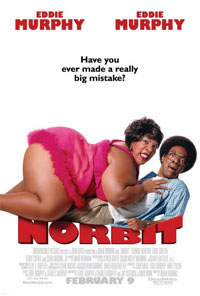
Perhaps Mitch should be more like Brian Robbins. Do you think that Brian cares that none of the critics liked Norbit?
His argument is that the critics are complaining about what the game doesn't have, versus what it actually does have. Unfortunately that's not true, he's right that people are docking him for what the game doesn't have (mostly because the aspects of the games he's missing are standard in most other games), but they certainly do address what the game has going for it. Most of the reviews out there are conflicted, they want to like the game because it has great ideas and is a lot of fun, but at $60 it's hard to justify the purchase ... especially when compared to what you get with similar games.
The one theme you'll notice throughout this entire article is that Mitch hates people bringing up the price and feels like he's being personally attacked. He hates the fact that the game is getting scores in the 7.0 range and suggests that it hurts him personally. Certainly Mitch is entitled to his own opinion, but as we go through this list of quotes I hope to explain that what he views as attacks and unfair practices are actually people complaining about relevant problems. Whether you like the game or not, Mitch does himself a disservice by attacking the critics and comparing himself to other games that are better values.
Quote 2: Is Blender Still Around?

Knowing Blender they would probably give my full priced CD, "This CD Only Has Four Songs", five stars out of five. That seems to be how they roll!
"And a lot of [the critics] also say, "there's no single player." Like, no shit there's no single player! What did I go around telling people that there was totally single player and then bait and switch them? Since the very beginning every interview we do, every article that's written about the game, it's a multi-player only first-person shooter. Yeah, there's single player bots and stuff like that, but we didn't misrepresent anything."
Reality:
Let's tackle this with an analogy. Let's say that you released a CD called "This CD Only Has Four Songs." Even though you only decided to record four short songs you (or the distribution house) decide that it's a good idea to charge the full $17.99 manufacturer suggested retail price for the 16 minutes of music you painstakingly recorded. Is that a good value? Of course it isn't, especially when you compare it to any new CD put out by any number of musicians. It doesn't matter that you warned people that they are only getting four songs for your $18, the fact still remains that compared to the "standard" album your CD comes up way short.
Do you not think that Rolling Stone or Blender Magazine would ignore the lack of songs? It's not like the artist misrepresented what was on the album, it plainly states that there are only four songs on both the front and the back; you should know what you're getting yourself in for. But since it's such a bad value one has to assume that it would be mentioned (even if just in passing) by most major music critics. Sure Mitch told us that Shadowrun was going to be online-only, but that doesn't mean that it's not worth mentioning in the full write up on the game.
Do you not think that Rolling Stone or Blender Magazine would ignore the lack of songs? It's not like the artist misrepresented what was on the album, it plainly states that there are only four songs on both the front and the back; you should know what you're getting yourself in for. But since it's such a bad value one has to assume that it would be mentioned (even if just in passing) by most major music critics. Sure Mitch told us that Shadowrun was going to be online-only, but that doesn't mean that it's not worth mentioning in the full write up on the game.
Quote 3: Price and Value!
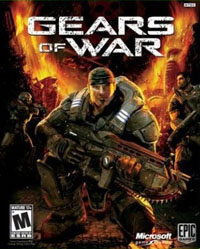
Shadowrun is a fun game, but it's Gears of War that is an "amazing" game!
"So could you have gone a different route? Because all everybody looks at is the review score and sometimes they don't even read the reviews. Could you give the game a solid review going, "wow, that was amazing! 8.5 out of ten, this is one of the best games." Let the buyer beware, though, there are only nine maps in here or blah blah blah or something, reviewing the content so that people can see, wow, this is an amazingly high quality game and then putting a caveat in there saying, "however, we don't think it's worth sixty dollars." Do you think the dollar amount of the thing justifies the lowering the review score so much that people don't actually see past the number?"
Reality:
To me it sounds like Mitch wants to write his own review. He seems to think that people just aren't willing to read reviews and give games with a 7.0 a chance. At least, that's what I gather from this bizarre statement that practically begs critics to go against their better judgment and give the game a great score even when it does have a number of flaws. The problem I have is that despite the fact that I review video games, most of the time I'm not actually telling the development team how to do their job. I personally don't know how to do their job, so you won't hear me telling them better ways of doing this and that. Rather, what most critics do is mention that the gameplay isn't good or that the graphics could be better ... things that any reasonable person could surmise based on playing the game. One shouldn't have to know how to program games in order to review them. And the same goes for game developers. There's no reason for Mitch to try and tell game critics how to do their job. I can understand being upset, but there is a world of difference between reviewing a game and making one.
But even beyond that, my issue with this statement is that at no time did I proclaim that this was an awesome game. He asks why we didn't just say, "Wow! That was amazing! This is one of the best games." The biggest problem with a statement like that is that I never felt that way about the game, and I have a hunch that most of my game reviewing colleagues felt the same way as me. Did most people have a good time playing Shadowrun? Of course they did, the game is an enjoyable experience full of great ideas. But just because your game is fun and has good ideas, that doesn't mean that you deserve to be raved about. We live in a world where good games come out every month, it takes a very special kind of game to be considered "amazing," and sadly Shadowrun is not that game.
But even beyond that, my issue with this statement is that at no time did I proclaim that this was an awesome game. He asks why we didn't just say, "Wow! That was amazing! This is one of the best games." The biggest problem with a statement like that is that I never felt that way about the game, and I have a hunch that most of my game reviewing colleagues felt the same way as me. Did most people have a good time playing Shadowrun? Of course they did, the game is an enjoyable experience full of great ideas. But just because your game is fun and has good ideas, that doesn't mean that you deserve to be raved about. We live in a world where good games come out every month, it takes a very special kind of game to be considered "amazing," and sadly Shadowrun is not that game.
Quote 4: Mitch Doesn't Read Reviews!

Video game playing cats may not need to look past the review score, but Mitch has no excuse!
"Because when I read reviews I look at the number first and then I decide whether I want to read the review at all. If it gets a seven then I don't even read the review. If it gets a five or a four I'm going to read it because it's going to be funny. And if it's an eight and a half or above I'm going to read it to see if it's for me."
Reality:
One of my biggest pet peeves about the video game industry is that very few gamers actually read the full reviews written by me and other talented game critics (I even bitched about it in last week's This Week In Defunct Games podcast). So often I hear people complain about a score and then wonder why the writer thought the game was bad ... something that could be easily figured out by just reading the review. That's all you have to do, read the review and figure out why something is good or bad. We don't spend our time writing those reviews just so people will look at the score and ignore everything else.
But I digress, the fact that this is a game developer admitting that he's no better than the snot-nosed thirteen year old Pokemon fan who only looks at the score makes my heart hurt. If anybody would understand how frustrating it is to only look at the scores it's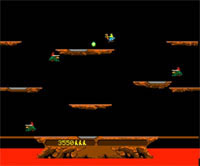
Shadowrun isn't a "5.0" game ... Joust is!
this guy. Game developers have to put up with the same things, like people who only look at the graphics or the people that judge a game long before it actually comes out. You would think that this guy would be a little more willing to give the writer the benefit of the doubt and actually read the article before bitching ... but apparently that's not the case.
And while we're on the subject, from a writer's point of view the hardest reviews in the world to write are those that get a 5.0. That score means that the game is average in every way. It doesn't try to be anything impressive, yet it isn't one of the worst games of all time. A 5.0 doesn't mean that it's going to be a funny review, if anything it means that it's going to be a boring review because it's hard to talk about something that is unremarkable in every way. A 7.0 is still a good score, it's not an 8 or a 9, but it's still worth playing. I think the biggest problem with Mitch is that he doesn't understand how the review scores work.
But I digress, the fact that this is a game developer admitting that he's no better than the snot-nosed thirteen year old Pokemon fan who only looks at the score makes my heart hurt. If anybody would understand how frustrating it is to only look at the scores it's

Shadowrun isn't a "5.0" game ... Joust is!
And while we're on the subject, from a writer's point of view the hardest reviews in the world to write are those that get a 5.0. That score means that the game is average in every way. It doesn't try to be anything impressive, yet it isn't one of the worst games of all time. A 5.0 doesn't mean that it's going to be a funny review, if anything it means that it's going to be a boring review because it's hard to talk about something that is unremarkable in every way. A 7.0 is still a good score, it's not an 8 or a 9, but it's still worth playing. I think the biggest problem with Mitch is that he doesn't understand how the review scores work.
Quote 5: We Are Our Own Worst Enemies!

Mitch doesn't understand that there's a big difference between a good game (Shadowrun) and a bad game (Tomagotchi Party On)!
"Let me tell you what happens, right. You know, you get, what's that, GameStats.com, right. The average review for Shadowrun is something hovering around a 7.0. [...] People look at that and say, "it's an "eh" game." And that's not fair. And not only that, but the thing that bothers me as a consumer, the things that worry me as a game developer, is that we put a ton of innovation into the gameplay itself and the cross-platform controls and bringing these two platforms together. And when you're an executive at a major corporation or when you're a publisher, y'know, you look at those rankings and go you, "hmm I guess that innovation didn't bear fruit." Right? And whenever I talk to reviewers and the people in the press they all talk about how the first-person shooter genre, y'know, could really use some innovation, it's been the same me-too thing for years and years, and then we come out and we actually do something and the review score doesn't actually reflect that, it makes executives think twice about supporting people like me and my team that are really pushing to innovate. And then what you get is, y'know, X-Game 24, because all they want to do is sequels one after the other. There are repercussions here for the gamer, we are basically shooting our own people in the foot by not recognizing, y'know, what these developers are doing."
Reality:
It's one thing to complain about the score your game got, but the moment you start going into hyperbole you should have somebody smack you and let you know that it's time to dial it down a bit. I don't think there's any other way of looking at it; with this quote Mitch has gone way past normal bitching and turned it into a political cause. Do some publishers base their pay structure and upcoming games on review

Shadowrun may not be the game of the year, but it's certainly not an "eh" game!
scores? Yes, I suspect some do. But at the same time all publishers (no matter who they are) are more interested in game sales than the scores. If your game sells two million copies then who cares if some critic gave your game a 7.0?
Furthermore, the whining about innovation has got to stop. He complains that if somebody innovates and only gets a 7.0 then why even bother. Unfortunately the truth is that had Shadowrun not had the innovative features (the magic, tech and whatnot) then most critics would have given the game a 5.0 - 6.0. What he's not seeing is that the innovation actually did help his cause, just not enough to warrant the super high scores he's looking for.
The idea that we're shooting ourselves in the foot because we give a game a 7.0 is ridiculous. There are plenty of bad games with great ideas, does that mean we should give every game with a new idea a 9.0 and ignore everything else that's wrong with it? I understand that we want to reward innovative game making, but we also want to make sure that the games we play are worth the $60 they cost. These critics (just like Mitch and everybody that plays Shadowrun) are entitled to their own opinion, but many of these writers didn't feel that the game was as good as it should have been. We don't take pleasure in saying that, we want this game (and all games) to be the best that they can be. We applaud innovation, but you have to make sure that you aren't just riding on the coattails of that innovation. If the only thing you have going for you is a gimmick then chances are a 7.0 is the best you can expect.

Shadowrun may not be the game of the year, but it's certainly not an "eh" game!
Furthermore, the whining about innovation has got to stop. He complains that if somebody innovates and only gets a 7.0 then why even bother. Unfortunately the truth is that had Shadowrun not had the innovative features (the magic, tech and whatnot) then most critics would have given the game a 5.0 - 6.0. What he's not seeing is that the innovation actually did help his cause, just not enough to warrant the super high scores he's looking for.
The idea that we're shooting ourselves in the foot because we give a game a 7.0 is ridiculous. There are plenty of bad games with great ideas, does that mean we should give every game with a new idea a 9.0 and ignore everything else that's wrong with it? I understand that we want to reward innovative game making, but we also want to make sure that the games we play are worth the $60 they cost. These critics (just like Mitch and everybody that plays Shadowrun) are entitled to their own opinion, but many of these writers didn't feel that the game was as good as it should have been. We don't take pleasure in saying that, we want this game (and all games) to be the best that they can be. We applaud innovation, but you have to make sure that you aren't just riding on the coattails of that innovation. If the only thing you have going for you is a gimmick then chances are a 7.0 is the best you can expect.
Quote 6: Shadowrun vs. Madden NFL?
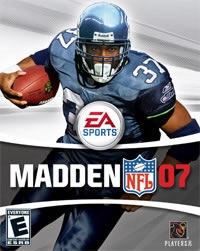
Sure football is only played one way, but at least there's a deep single player experience!
"So, how many game types are there in football? Any sports game?"
Reality:
Talk about an apples to oranges argument. While Mitch is right that football only has one "official" way to play the game, that doesn't mean that you can compare it to Shadowrun's paltry two game modes. If Madden NFL was an online-only sports game that would be one thing, but he seems to be forgetting that most football games offer a lengthy single-player mode that will keep you busy for dozens (if not hundreds) of hours. And that's not all; recent Madden games have even given you alternate ways of playing the single player mode. For example, in last year's Madden entry you were able to play as one single superstar. This meant that you could play the entire season as only one character, be it a kicker, quarterback or what have you. And that's not the only mode available to you. When it comes right down to it there is generally enough value in most current football games to warrant the price for a fan of the sport. Does that mean that EA should release the same game every year? Of course not, but that's a whole other argument for another time.
What it comes down to is that Shadowrun is a multiplayer-only game, the type of game you can only play online. And since it's only online you have to judge it based on what it offers, and with only two different game types it's hard to simply ignore the game's shortcomings. Does that mean it's a bad game? Of course not, but then again, nobody is saying that it's a bad game.
What it comes down to is that Shadowrun is a multiplayer-only game, the type of game you can only play online. And since it's only online you have to judge it based on what it offers, and with only two different game types it's hard to simply ignore the game's shortcomings. Does that mean it's a bad game? Of course not, but then again, nobody is saying that it's a bad game.
Quote 7: Is Shadowrun Innovative?
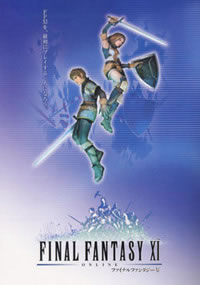
Final Fantasy XI may not be the best game in the world, but it does have the distinction of being a cross-platform title for the Xbox 360!
"Did we make the first cross-platform game?"
Reality:
Actually, no you didn't. This is something that Mitch continues to pound, as if it's the most important talking point in his arsenal. Mitch claims that Shadowrun is the first game that allows you to play consoles against computers, which would be true if he wasn't ignoring at least two other games in the last ten years. For one thing, Quake III on the Dreamcast allowed console gamers the opportunity to play against their keyboard wielding PC brethren. While it wasn't a perfect marriage, the concept is certainly not new to the first-person shooter genre. It's also not new to the massively multiplayer online role-playing genre, either. When Final Fantasy XI was released both PC gamers and PlayStation 2 gamers had the same opportunity to explore the world of Vana'diel. And that's not all, a couple years later Square Enix allowed Xbox 360 owners a chance to interact with the PlayStation 2 and PC adventurers. That's right; Shadowrun isn't even the first Xbox 360 game to use cross-platform play.
What is more offensive to me, though, is that Major Nelson (Larry Hryb) just goes on to agree with Mitch about everything. He doesn't stand silent; he actually adds in the "check" when Mitch asks, "Did we make the first cross-platform game?" I don't expect Mitch to know everything about the Dreamcast and the world of video games, but shouldn't he at least know that Final Fantasy XI is a cross-platform game? I would be less offended if he just sat there silent, but to have him almost gleefully check stuff off of the list as if Mitch is reading the gospel is downright appalling.
What is more offensive to me, though, is that Major Nelson (Larry Hryb) just goes on to agree with Mitch about everything. He doesn't stand silent; he actually adds in the "check" when Mitch asks, "Did we make the first cross-platform game?" I don't expect Mitch to know everything about the Dreamcast and the world of video games, but shouldn't he at least know that Final Fantasy XI is a cross-platform game? I would be less offended if he just sat there silent, but to have him almost gleefully check stuff off of the list as if Mitch is reading the gospel is downright appalling.
Quote 8: Give Me the Score I Think I Deserve!
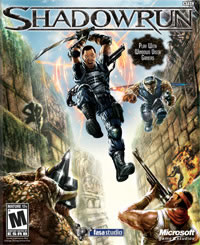 Mitch, we gave you the score that your game deserved ... you are just having a hard time accepting that opinion!
Mitch, we gave you the score that your game deserved ... you are just having a hard time accepting that opinion!"Alright, can you please just give me the review score that my team deserves?"
Reality:
This is the moment when Mitch goes from simply complaining to what we in the industry call whining. He wants us to give his game the score that they deserve, as if what we did was rate the game lower because we had a personal vendetta against him and his team at FASA. Nothing could be further from the truth. When it comes to reviewing games most honest game critics don't take into consideration who made the game or what their motives were, instead they review the game, the value of the package and whether or not it has legs. In the case of Shadowrun most critics seem to agree that the game isn't worth $60 and the overall product doesn't have legs.
What's more, Mitch is treating the 7.0 as if it's radioactive. There's absolutely nothing wrong with a 7.0, it's a score that a lot of games wouldn't mind receiving. Sure, it's not above an 8.0, but you're trying to sell us on a $60 game that is online-only and features a measly nine maps. As far as I'm concerned your review could have been a whole lot worse given what the package comes with (or, more appropriately, doesn't come with). But don't tell me that most critics didn't give you the score your team deserved ... we gave you the score WE thought you deserved, not the score YOU thought you deserved.
What's more, Mitch is treating the 7.0 as if it's radioactive. There's absolutely nothing wrong with a 7.0, it's a score that a lot of games wouldn't mind receiving. Sure, it's not above an 8.0, but you're trying to sell us on a $60 game that is online-only and features a measly nine maps. As far as I'm concerned your review could have been a whole lot worse given what the package comes with (or, more appropriately, doesn't come with). But don't tell me that most critics didn't give you the score your team deserved ... we gave you the score WE thought you deserved, not the score YOU thought you deserved.
Quote 9: Critic vs. Consumer!
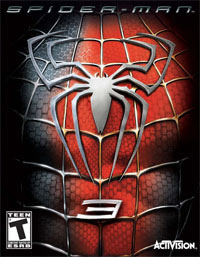
Spider-Man 3 is just one of the many games that the GameSpot users liked more than the GameSpot critics!
"Yeah, if you go on to, I don't know, some of the things, it's like review score is 7.0 and then fan review is 8.4. It's like, hmm. Something's going on here. I was wondering does this happen to a lot of games, and we've done a little research and this is one of the only games that has this sort of weird dichotomy between professional, quote/unquote reviewers/review, and uh what the gaming public is saying. So that's why we can go to work in the morning."
Reality:
So Shadowrun is the only game where the critics didn't like it but "regular" game fans did? And you actually did your research to come up with that? Hmm ... I wonder how fast it will take me to debunk that claim. Oh wait, I already did, because no more than a minute later I discovered that GameSpot gave Red Steel a 5.5, while the GameSpot users gave it a 7.3. And that's not the only game, GameSpot said that Spider-Man 3 was a 4.7 and the
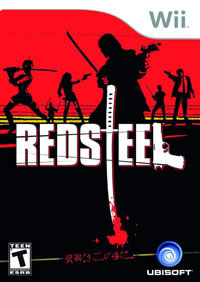
Red Steel is another one of those games!
GameSpot fans said that it was a solid 7.0. And it's not just GameSpot, IGN reviewed Mario Party 8 and gave it a 5.2, which is a far cry from the 7.6 the IGN readers gave it. Shadowrun is hardly the first game to score better amongst gamers than the game press, so get off your high horse and just accept that sometimes the critics and the gamers disagree. And for what it's worth, Shadowrun actually ranked lower among 1up.com's readers than it did with the actual person that reviewed the game.
Of course this is nothing new. Just look at the disconnect between movie goers and movie critics. Do you think the critics wanted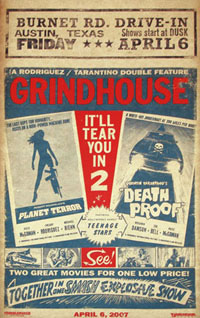
If critics had their druthers then Grindhouse would have been an overwhelming success!
Norbit to be a top grossing movie? And what about the number one movie in the country, Evan Almighty? Based on the critic scores only 22% (29 of 102) of the critics actually enjoyed the movie ... yet here it is bringing in $30 million dollars and unseating Fantastic Four, Spider-Man and Surf's Up. If the critics had their way then 1408 or Knocked Up would be the number one movie, but that's just not in the cards. The same goes for games, no matter how many times I tell people to go out and buy Puzzle Quest the really bad games like Mario Party 8 and Spider-Man 3 will always get more attention.
And then there's the fact that a lot of these people that leave user reviews aren't exactly the most credible sources. Let's face it, the advantage that a "real" game critic has over a fan is that most of the GameSpot, IGN and 1up.com writers have played hundreds of games this year ... far more than your average game fan. Playing that many games allows you to actually see how a game fits into a bigger picture, something that is completely lost by Joe Schmo, the guy who only plays a few games a year. What's more, most people want to justify their purchase. You see it all the time, when somebody buys a $60 game they want to feel good about spending the money, even if it's at the expense of objectivity. I would certainly argue that this is something that the reviewers (who don't pay for their games) have over the regular gamer.

Red Steel is another one of those games!
Of course this is nothing new. Just look at the disconnect between movie goers and movie critics. Do you think the critics wanted

If critics had their druthers then Grindhouse would have been an overwhelming success!
And then there's the fact that a lot of these people that leave user reviews aren't exactly the most credible sources. Let's face it, the advantage that a "real" game critic has over a fan is that most of the GameSpot, IGN and 1up.com writers have played hundreds of games this year ... far more than your average game fan. Playing that many games allows you to actually see how a game fits into a bigger picture, something that is completely lost by Joe Schmo, the guy who only plays a few games a year. What's more, most people want to justify their purchase. You see it all the time, when somebody buys a $60 game they want to feel good about spending the money, even if it's at the expense of objectivity. I would certainly argue that this is something that the reviewers (who don't pay for their games) have over the regular gamer.
Quote 10: Shadowrun > Team Fortress 2!

Don't even ask how many times we've used this Half-Life 2 picture ... but I don't have a clue!
"As a matter of fact, Valve just came out talking about Team Fortress 2, which is a multiplayer-only online game, and said, "We're coming out with six maps. That's it." Because, and their justification for it, they said, "you can make hundreds of maps but let's face it you only play on a few of them. Now granted there's some dynamic elements to those maps, but there's also dynamic elements in Shadowrun that they don't have either. Those guys, arguably some of the best game developers in the entire world, are saying the same thing I am."
Reality:
This may just be the worst comparison of all time. This is equivalent of comparing William Hung to Pink Floyd; it's just not something you can do with a straight face. This is not just a bad comparison, but it's downright insulting to anybody that actually knows what he's talking about. If you were to just take him at his word then it sounds like he's saying that his $60 Shadowrun is a better value because you get more maps. However, what he's not telling you is that the game he's comparing Shadowrun to, Team Fortress 2, is actually one part of a $60 game. That's right; it's not actually the same price as Shadowrun.
So get this, Team Fortress 2 is part of a five game package known as Half-Life 2: The Orange Box. This one $60 game comes with five titles, including the full version of Half-Life 2, Half-Life 2: Episode 1, Half-Life 2: Episode 2, the brain teaser Portal, and, of course, Team Fortress 2. If you did the math then Team Fortress 2 is only $12, which is considerably cheaper than the $60 Shadowrun. Comparing your $60 game to what is essentially $12 is not only ludicrous, but it's downright offensive!
So get this, Team Fortress 2 is part of a five game package known as Half-Life 2: The Orange Box. This one $60 game comes with five titles, including the full version of Half-Life 2, Half-Life 2: Episode 1, Half-Life 2: Episode 2, the brain teaser Portal, and, of course, Team Fortress 2. If you did the math then Team Fortress 2 is only $12, which is considerably cheaper than the $60 Shadowrun. Comparing your $60 game to what is essentially $12 is not only ludicrous, but it's downright offensive!
Quote 11: Stuff is a Changing!

Those Sam & Max episodes are a great example of how the industry is changing. Then again, these games were only $8, versus Shadowrun's $60 asking price!
"Absolutely we're battling expectations, and gamers, consumers, are going to have to give that up soon. Because stuff's changing ... we're on the leading edge of changing that."
Reality:
So wait a second ... it's US who are going to have to change our thinking? And why is that? Because after spending four years working on a game you, Mitch Gitelman, can only produce a multiplayer game with two different game types and nine levels? Maybe it's just me, but that doesn't seem reasonable at all. The gaming community isn't at the whim on one or two people, it's a big group that will tell Mitch, Microsoft and all of the other major players in the video game industry, what they want and don't want. Mitch may be 100% correct when he states that gamers will get used to this kind of pricing, but that's not going to happen because we "give that up," it will happen because gamers decide that it's worth the price. I personally consider Shadowrun to be a poor
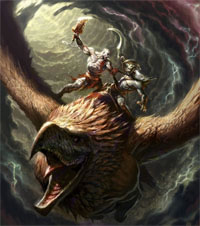
Considering that God of War II was only $50 it came with a surprising amount of cool extra content!
value (for all of the reasons I have already expressed), so when I hear somebody say that a game like Shadowrun (with its limited modes, missing single-player, nine levels, etc.) is on the "leading edge" of changing the future it makes me worry about the games industry.
Thankfully other companies are proving Mitch wrong. Other online-only games, such as Sony's upcoming Warhawk for the PlayStation 3, are being priced lower to make up for the lack of extra modes. Although a price has yet to be set for Warhawk, most agree that it will be in the $30 - $40 range ... a far cry from what gamers are being asked to pay for Shadowrun. And that's not all; there are plenty of major games that come out at $60 that offer enough content to warrant the price tag. I don't think anybody is going to complain about the amount of stuff in God of War 2, The Legend of Zelda: Twilight Princess, or The
Everybody loves Guitar Hero - which is probably why it's constantly on the top ten sales (and Xbox Live) list!
Elder Scrolls IV: Oblivion. That's not to say that all games are worth the price, but even the mediocre third party titles that come out each month have enough content to dispute what Mitch is saying. As far as I can tell Shadowrun is one of the only games out there that is asking full price for what should be a budget title. And just because he says that this is the future doesn't make it so.
One could argue that Shadowrun isn't selling as well as Microsoft hoped, which may go against some of what Mitch is trying to say in his complaint. Although the game has yet to be out a full month, the May NPD numbers have come in and Shadowrun is nowhere to be seen. The same can be said about the weekly Xbox Live figures. Despite the fact that the game has been out for almost four weeks, it's only this week that Shadowrun managed to break the top ten ... at number ten. What was more popular than Shadowrun this week? For one thing the four month old Crackdown is still doing better than the brand new Shadowrun. As is Call of Duty 3, Rainbow Six Vegas and Guitar Hero II. What's more, the Tenchu Z demo is at number seven on the list. Some may argue that Shadowrun hasn't been out long enough to warrant high numbers of the Xbox Live list, yet what tends to happen is that when a new game comes out it debuts extremely high and then starts to drop down little by little. That's certainly what happened to Command and Conquer 3, Crackdown, and Ghost Recon Advanced Warfighter 2. Perhaps the most amusing part of this whole list is that Major Nelson himself uses that tenth place finish to demonstrate that Shadowrun is hugely popular. Just not more popular than the Tenchu Z demo.

Considering that God of War II was only $50 it came with a surprising amount of cool extra content!
Thankfully other companies are proving Mitch wrong. Other online-only games, such as Sony's upcoming Warhawk for the PlayStation 3, are being priced lower to make up for the lack of extra modes. Although a price has yet to be set for Warhawk, most agree that it will be in the $30 - $40 range ... a far cry from what gamers are being asked to pay for Shadowrun. And that's not all; there are plenty of major games that come out at $60 that offer enough content to warrant the price tag. I don't think anybody is going to complain about the amount of stuff in God of War 2, The Legend of Zelda: Twilight Princess, or The

Everybody loves Guitar Hero - which is probably why it's constantly on the top ten sales (and Xbox Live) list!
One could argue that Shadowrun isn't selling as well as Microsoft hoped, which may go against some of what Mitch is trying to say in his complaint. Although the game has yet to be out a full month, the May NPD numbers have come in and Shadowrun is nowhere to be seen. The same can be said about the weekly Xbox Live figures. Despite the fact that the game has been out for almost four weeks, it's only this week that Shadowrun managed to break the top ten ... at number ten. What was more popular than Shadowrun this week? For one thing the four month old Crackdown is still doing better than the brand new Shadowrun. As is Call of Duty 3, Rainbow Six Vegas and Guitar Hero II. What's more, the Tenchu Z demo is at number seven on the list. Some may argue that Shadowrun hasn't been out long enough to warrant high numbers of the Xbox Live list, yet what tends to happen is that when a new game comes out it debuts extremely high and then starts to drop down little by little. That's certainly what happened to Command and Conquer 3, Crackdown, and Ghost Recon Advanced Warfighter 2. Perhaps the most amusing part of this whole list is that Major Nelson himself uses that tenth place finish to demonstrate that Shadowrun is hugely popular. Just not more popular than the Tenchu Z demo.
Quote 12: Critics Aren't Journalists!
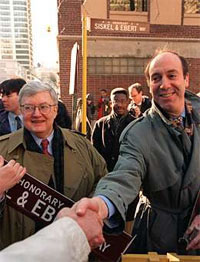
If the people that "learned to type" and reviewed Shadowrun aren't journalists, then neither is Roger Ebert!
"And of course, a lot of the reviewers that I [garbled], reviewers that I read, y'know, aren't actually journalists. What they are are fans that learned to type."
Reality:
I know I probably shouldn't, but I actually do take offense to this. The notion that game critics are nothing more than fans that learned how to type is offensive on several levels. It's not that I learned how to type ... it's that I learned how to string sentences together in a compelling way. If the only thing I could do is type then nobody would read my reviews and articles. What most game critics have learned to do is explain their opinions in insightful and entertaining ways, so that it never feels like a chore to see what they have to say. If you go and read your average user

We can't all be Christiane Amanpour, but that doesn't mean we aren't journalists at heart!
review on GameFAQs or GameSpot you'll find that most of those gamers know how to type, but stringing thoughts together in a concise and enjoyable way is definitely more difficult.
And while we're at it, is Roger Ebert a journalist? Would you consider Rex Reed or Lester Banks to be the same as Christiane Amanpour?? I think not! None of us are claiming to be journalists, if anything we're editorial writers. While a lot of us tend to also work on actual articles (such as this one), at their heart they are still just writing opinions and rewording the news. Outside of going to conventions and doing interviews with industry veterans, I'm not exactly using my investigative journalist expertise for much these days.
On the other hand, what makes a writer a journalist? Wikipedia suggests that "a journalist is a person who practices journalism, the gathering and dissemination of information about current events, trends, issues and people." Am I not doing that?? The American Heritage Dictionary is even broader, they claim it's "one whose occupation is journalism." While Jeff Gerstmann isn't exactly parachuting into the frontlines of hostile territory, there's no denying that he does exactly what the dictionary suggests. It's nice to see that Mitch has such high regard for people that review his games. I can only imagine that if everybody gave his game rave reviews he would be whistling a different tune.

We can't all be Christiane Amanpour, but that doesn't mean we aren't journalists at heart!
And while we're at it, is Roger Ebert a journalist? Would you consider Rex Reed or Lester Banks to be the same as Christiane Amanpour?? I think not! None of us are claiming to be journalists, if anything we're editorial writers. While a lot of us tend to also work on actual articles (such as this one), at their heart they are still just writing opinions and rewording the news. Outside of going to conventions and doing interviews with industry veterans, I'm not exactly using my investigative journalist expertise for much these days.
On the other hand, what makes a writer a journalist? Wikipedia suggests that "a journalist is a person who practices journalism, the gathering and dissemination of information about current events, trends, issues and people." Am I not doing that?? The American Heritage Dictionary is even broader, they claim it's "one whose occupation is journalism." While Jeff Gerstmann isn't exactly parachuting into the frontlines of hostile territory, there's no denying that he does exactly what the dictionary suggests. It's nice to see that Mitch has such high regard for people that review his games. I can only imagine that if everybody gave his game rave reviews he would be whistling a different tune.
HOME |
CONTACT |
NOW HIRING |
WHAT IS DEFUNCT GAMES? |
NINTENDO SWITCH ONLINE |
RETRO-BIT PUBLISHING
Retro-Bit |
Switch Planet |
The Halcyon Show |
Same Name, Different Game |
Dragnix |
Press the Buttons
Game Zone Online | Hardcore Gamer | The Dreamcast Junkyard | Video Game Blogger
Dr Strife | Games For Lunch | Mondo Cool Cast | Boxed Pixels | Sega CD Universe | Gaming Trend
Game Zone Online | Hardcore Gamer | The Dreamcast Junkyard | Video Game Blogger
Dr Strife | Games For Lunch | Mondo Cool Cast | Boxed Pixels | Sega CD Universe | Gaming Trend
Copyright © 2001-2025 Defunct Games
All rights reserved. All trademarks are properties of their respective owners.
All rights reserved. All trademarks are properties of their respective owners.













